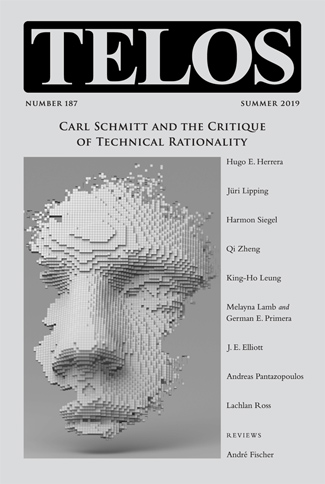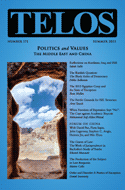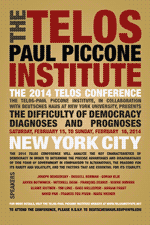By King-Ho Leung · Thursday, July 18, 2019 King-Ho Leung’s “Living Paradoxes: On Agamben, Taylor, and Human Subjectivity” appears in Telos 187 (Summer 2019). Read the full article at the Telos Online website, or purchase a print copy of the issue in our online store. Individual subscriptions to Telos are available in both print and online formats.
 Over the last two decades, Giorgio Agamben and Charles Taylor have produced important and influential genealogical works on the philosophical and political conceptions of secularity. Yet in their recent work, both of these thinkers have respectively returned to a prominent theme in their earlier works: human life. This essay offers a parallel reading of Agamben and Taylor as post-Heideggerian critics of the modern conception of human subjectivity. Through examining these their respective characterizations of modern subjectivity—namely, Taylor’s account of the “disengaged self” and Agamben’s conception of the “excluded-included” bare life—this essay seeks to highlight not only the Heideggerian currents underlying the philosophical anthropologies of Agamben and Taylor, but also the ontological paradoxicalities they detect in the conception of human existence and subjectivity in politico-philosophical modernity. After reviewing the different aspects of Agamben’s and Taylor’s critiques of modern subjectivity as well as the traditional metaphysical conception of humans as “language animals,” this essay concludes by sketching a robust and affirmative “paradoxical” conception of human beings as “language animals” that simultaneously takes into account the insights from Taylor’s (post)analytic philosophical renewal of Aristotelianism and Agamben’s critical analysis of contemporary biopolitics in the continental philosophical tradition. Over the last two decades, Giorgio Agamben and Charles Taylor have produced important and influential genealogical works on the philosophical and political conceptions of secularity. Yet in their recent work, both of these thinkers have respectively returned to a prominent theme in their earlier works: human life. This essay offers a parallel reading of Agamben and Taylor as post-Heideggerian critics of the modern conception of human subjectivity. Through examining these their respective characterizations of modern subjectivity—namely, Taylor’s account of the “disengaged self” and Agamben’s conception of the “excluded-included” bare life—this essay seeks to highlight not only the Heideggerian currents underlying the philosophical anthropologies of Agamben and Taylor, but also the ontological paradoxicalities they detect in the conception of human existence and subjectivity in politico-philosophical modernity. After reviewing the different aspects of Agamben’s and Taylor’s critiques of modern subjectivity as well as the traditional metaphysical conception of humans as “language animals,” this essay concludes by sketching a robust and affirmative “paradoxical” conception of human beings as “language animals” that simultaneously takes into account the insights from Taylor’s (post)analytic philosophical renewal of Aristotelianism and Agamben’s critical analysis of contemporary biopolitics in the continental philosophical tradition.
Continue reading →
By David Pan · Monday, June 17, 2019 Telos 187 (Summer 2019) is now available for purchase in our store. Individual subscriptions to Telos are also available in both print and online formats.
 After a modern era of technological progress that has led humans to believe in their increasing ability to control nature, we are reaching a point at which this power on a small scale has given way to increasing uncertainty and uncontrollability on the large scale. Not only are the specific effects of climate change difficult to predict and control, the only mechanisms available for such control—agreement and cooperation across national and cultural divides—are not the stuff of engineering but of politics. So with every technological advance that promises to bring us more control over our lives, we as a species are facing ever greater risks and uncertainties. The question concerning technology has become the unpredictability and uncontrollability of its development itself. The key difficulty is a problem of a tension between community or national interests and species-wide interests. While there might be an ethical imperative on a species-wide level to exercise self-restraint in pursuing dangerous technologies such as nuclear weapons, gene manipulation, or coal-fired power plants, such self-restraint could very well lead to the decline or even annihilation of the group that exercises it. The path forward will not be revealed by new technological advances, which can easily create more problems than they solve, but through the development of new ethical, political, and affective frameworks by which people understand themselves and their connections to the rest of the world. This issue of Telos, devoted to Carl Schmitt and the critique of technical rationality, investigates the ways in which Schmitt’s critique moved him toward ways of considering law, politics, and human history as fundamentally uncertain movements, requiring strategies that accept such unpredictability even as we try to intervene in our historical development as a species. After a modern era of technological progress that has led humans to believe in their increasing ability to control nature, we are reaching a point at which this power on a small scale has given way to increasing uncertainty and uncontrollability on the large scale. Not only are the specific effects of climate change difficult to predict and control, the only mechanisms available for such control—agreement and cooperation across national and cultural divides—are not the stuff of engineering but of politics. So with every technological advance that promises to bring us more control over our lives, we as a species are facing ever greater risks and uncertainties. The question concerning technology has become the unpredictability and uncontrollability of its development itself. The key difficulty is a problem of a tension between community or national interests and species-wide interests. While there might be an ethical imperative on a species-wide level to exercise self-restraint in pursuing dangerous technologies such as nuclear weapons, gene manipulation, or coal-fired power plants, such self-restraint could very well lead to the decline or even annihilation of the group that exercises it. The path forward will not be revealed by new technological advances, which can easily create more problems than they solve, but through the development of new ethical, political, and affective frameworks by which people understand themselves and their connections to the rest of the world. This issue of Telos, devoted to Carl Schmitt and the critique of technical rationality, investigates the ways in which Schmitt’s critique moved him toward ways of considering law, politics, and human history as fundamentally uncertain movements, requiring strategies that accept such unpredictability even as we try to intervene in our historical development as a species.
Continue reading →
By Matteo Calla · Thursday, July 30, 2015  This article places Benjamin’s late work in dialogue with recent attempts in media theory and structuralism to think the subject and historical contingency together. It argues their apparent incompatibility is reflected in Benjamin’s writing in the form of a recurrent contradiction between historical materialism and transhistorical theology. Through a reconstruction of the theorist’s historicization of an earlier theological theory of the fall of language in his Marxian-inflected work of the 1930’s, it claims that Benjamin initiates a historicist reconceptualization of the impasse of the Kantian subject onto being as the product of a particular field of mediation arising with mass modernity. Yet following the rejection of his nascent version of the Arcades Project by Adorno and the Marxist Institute for Social Research in 1938, theology returns as an attempt to reconceive of an aesthetic-formal break with this impasse. Benjamin’s late theorization of his materialist historiography thus represents a dialectical attempt to think materialism and theology, history and being together, with the aim of mediating not only distraction, but a revolutionary destruction of the subject and the historical order producing it. This article places Benjamin’s late work in dialogue with recent attempts in media theory and structuralism to think the subject and historical contingency together. It argues their apparent incompatibility is reflected in Benjamin’s writing in the form of a recurrent contradiction between historical materialism and transhistorical theology. Through a reconstruction of the theorist’s historicization of an earlier theological theory of the fall of language in his Marxian-inflected work of the 1930’s, it claims that Benjamin initiates a historicist reconceptualization of the impasse of the Kantian subject onto being as the product of a particular field of mediation arising with mass modernity. Yet following the rejection of his nascent version of the Arcades Project by Adorno and the Marxist Institute for Social Research in 1938, theology returns as an attempt to reconceive of an aesthetic-formal break with this impasse. Benjamin’s late theorization of his materialist historiography thus represents a dialectical attempt to think materialism and theology, history and being together, with the aim of mediating not only distraction, but a revolutionary destruction of the subject and the historical order producing it.
Continue reading →
By Mark S. Weiner · Thursday, April 10, 2014 The following paper was presented at the Eighth Annual Telos Conference, held on February 15–16, 2014, in New York City.
 As the final speaker after a fascinating day of talks, I’ll keep my comments brief. I’ll be addressing two questions about democracy raised by our conference description: first, “the reasons for its rarity and volatility”; and, second, “the factors that are essential for its stability.” For each question, I’ll try to provide a concise, mildly provocative answer from my perspective as a writer and scholar about constitutional law and comparative legal history. As the final speaker after a fascinating day of talks, I’ll keep my comments brief. I’ll be addressing two questions about democracy raised by our conference description: first, “the reasons for its rarity and volatility”; and, second, “the factors that are essential for its stability.” For each question, I’ll try to provide a concise, mildly provocative answer from my perspective as a writer and scholar about constitutional law and comparative legal history.
So why is democracy so rare and volatile? I think one answer we could give to this question is that democracy is volatile because the modern self is a legal achievement. There is nothing outside of law, including individual subjectivity. Instead, the modern self that lies at the center of liberal democratic practice developed only after a long historical process of dialectical negation and synthesis. In that process, a handful of societies, beginning in western Europe, transcended what in my most recent book I call the “rule of the clan.”
Continue reading →
By Telos Press · Friday, March 21, 2014 Telos Editorial Associate Jay Gupta recently spoke with C.S. Soong on Pacifica Radio’s Against the Grain, a show about politics, society, and ideas. Their conversation turned to ethics, objective vs. subjective truth, and the manner in which war is reported in the media. Listen the full interview at the Against the Grain website here.
Continue reading →
By Telos Press · Sunday, December 1, 2013 Chantal Bax’s Subjectivity After Wittgenstein: The Post-Cartesian Subject and the “Death of Man” is now available in paperback from Bloomsbury Academic. Although Wittgenstein is often held co-responsible for the so-called death of man as it was pronounced in the course of the previous century, no detailed description of his alternative to the traditional or Cartesian account of human being has so far been available. By consulting several parts of Wittgenstein’s later oeuvre, Subjectivity after Wittgenstein aims to fill this gap.
Continue reading →
|
|
 Over the last two decades, Giorgio Agamben and Charles Taylor have produced important and influential genealogical works on the philosophical and political conceptions of secularity. Yet in their recent work, both of these thinkers have respectively returned to a prominent theme in their earlier works: human life. This essay offers a parallel reading of Agamben and Taylor as post-Heideggerian critics of the modern conception of human subjectivity. Through examining these their respective characterizations of modern subjectivity—namely, Taylor’s account of the “disengaged self” and Agamben’s conception of the “excluded-included” bare life—this essay seeks to highlight not only the Heideggerian currents underlying the philosophical anthropologies of Agamben and Taylor, but also the ontological paradoxicalities they detect in the conception of human existence and subjectivity in politico-philosophical modernity. After reviewing the different aspects of Agamben’s and Taylor’s critiques of modern subjectivity as well as the traditional metaphysical conception of humans as “language animals,” this essay concludes by sketching a robust and affirmative “paradoxical” conception of human beings as “language animals” that simultaneously takes into account the insights from Taylor’s (post)analytic philosophical renewal of Aristotelianism and Agamben’s critical analysis of contemporary biopolitics in the continental philosophical tradition.
Over the last two decades, Giorgio Agamben and Charles Taylor have produced important and influential genealogical works on the philosophical and political conceptions of secularity. Yet in their recent work, both of these thinkers have respectively returned to a prominent theme in their earlier works: human life. This essay offers a parallel reading of Agamben and Taylor as post-Heideggerian critics of the modern conception of human subjectivity. Through examining these their respective characterizations of modern subjectivity—namely, Taylor’s account of the “disengaged self” and Agamben’s conception of the “excluded-included” bare life—this essay seeks to highlight not only the Heideggerian currents underlying the philosophical anthropologies of Agamben and Taylor, but also the ontological paradoxicalities they detect in the conception of human existence and subjectivity in politico-philosophical modernity. After reviewing the different aspects of Agamben’s and Taylor’s critiques of modern subjectivity as well as the traditional metaphysical conception of humans as “language animals,” this essay concludes by sketching a robust and affirmative “paradoxical” conception of human beings as “language animals” that simultaneously takes into account the insights from Taylor’s (post)analytic philosophical renewal of Aristotelianism and Agamben’s critical analysis of contemporary biopolitics in the continental philosophical tradition.  This article places Benjamin’s late work in dialogue with recent attempts in media theory and structuralism to think the subject and historical contingency together. It argues their apparent incompatibility is reflected in Benjamin’s writing in the form of a recurrent contradiction between historical materialism and transhistorical theology. Through a reconstruction of the theorist’s historicization of an earlier theological theory of the fall of language in his Marxian-inflected work of the 1930’s, it claims that Benjamin initiates a historicist reconceptualization of the impasse of the Kantian subject onto being as the product of a particular field of mediation arising with mass modernity. Yet following the rejection of his nascent version of the Arcades Project by Adorno and the Marxist Institute for Social Research in 1938, theology returns as an attempt to reconceive of an aesthetic-formal break with this impasse. Benjamin’s late theorization of his materialist historiography thus represents a dialectical attempt to think materialism and theology, history and being together, with the aim of mediating not only distraction, but a revolutionary destruction of the subject and the historical order producing it.
This article places Benjamin’s late work in dialogue with recent attempts in media theory and structuralism to think the subject and historical contingency together. It argues their apparent incompatibility is reflected in Benjamin’s writing in the form of a recurrent contradiction between historical materialism and transhistorical theology. Through a reconstruction of the theorist’s historicization of an earlier theological theory of the fall of language in his Marxian-inflected work of the 1930’s, it claims that Benjamin initiates a historicist reconceptualization of the impasse of the Kantian subject onto being as the product of a particular field of mediation arising with mass modernity. Yet following the rejection of his nascent version of the Arcades Project by Adorno and the Marxist Institute for Social Research in 1938, theology returns as an attempt to reconceive of an aesthetic-formal break with this impasse. Benjamin’s late theorization of his materialist historiography thus represents a dialectical attempt to think materialism and theology, history and being together, with the aim of mediating not only distraction, but a revolutionary destruction of the subject and the historical order producing it.  As the final speaker after a fascinating day of talks, I’ll keep my comments brief. I’ll be addressing two questions about democracy raised by our conference description: first, “the reasons for its rarity and volatility”; and, second, “the factors that are essential for its stability.” For each question, I’ll try to provide a concise, mildly provocative answer from my perspective as a writer and scholar about constitutional law and comparative legal history.
As the final speaker after a fascinating day of talks, I’ll keep my comments brief. I’ll be addressing two questions about democracy raised by our conference description: first, “the reasons for its rarity and volatility”; and, second, “the factors that are essential for its stability.” For each question, I’ll try to provide a concise, mildly provocative answer from my perspective as a writer and scholar about constitutional law and comparative legal history. 






